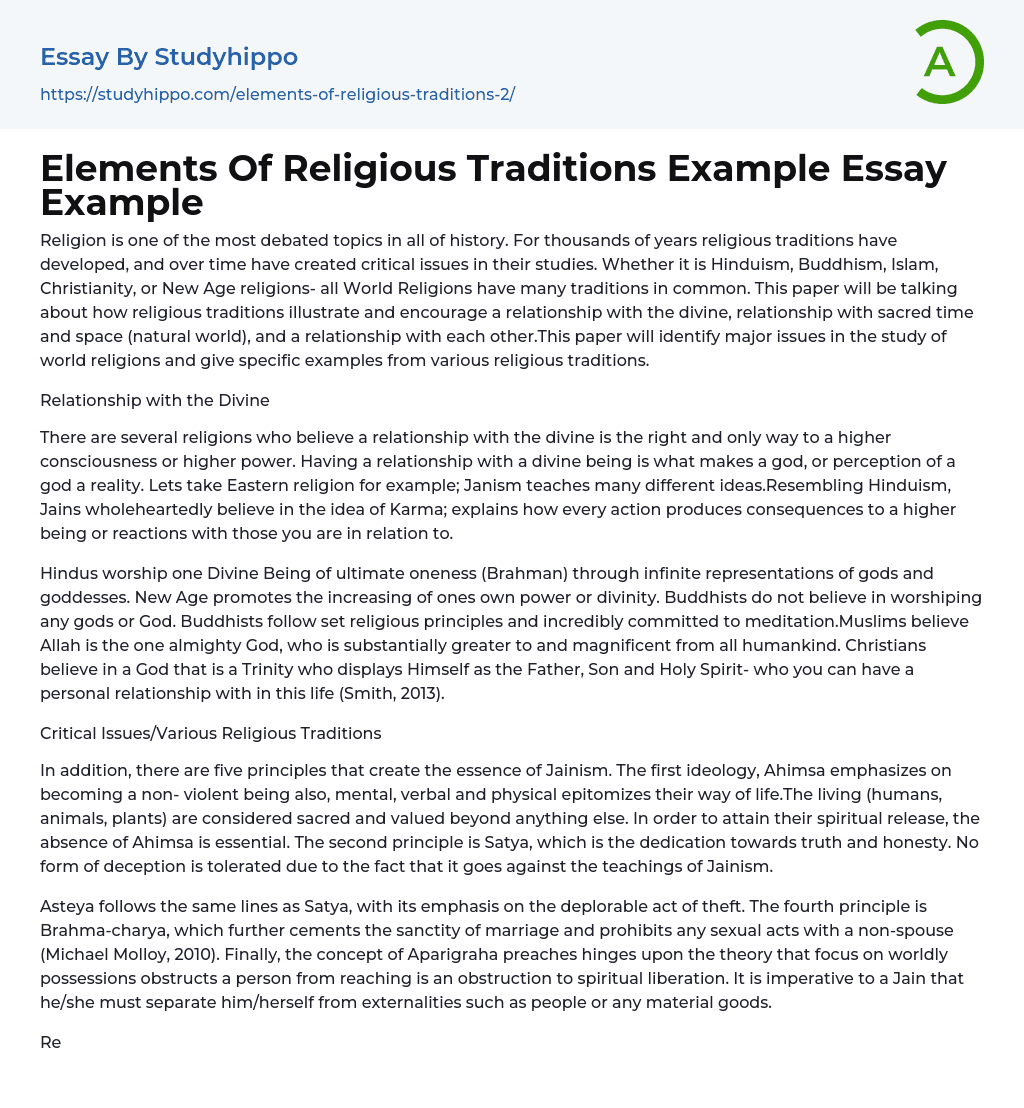
Religion is one of the most debated topics in all of history. For thousands of years religious traditions have developed, and over time have created critical issues in their studies. Whether it is Hinduism, Buddhism, Islam, Christianity, or New Age religions- all World Religions have many traditions in common. This paper will be talking about how religious traditions illustrate and encourage a relationship with the divine, relationship with sacred time and space (natural world), and a relationship with each other.This paper will identify major issues in the study of world religions and give specific examples from various religious traditions.
Relationship with the Divine
There are several religions who believe a relationship with the divine is the right and only way to a higher consciousness or higher power. Having a relationship with a divine being is what makes a go
...d, or perception of a god a reality. Lets take Eastern religion for example; Janism teaches many different ideas.Resembling Hinduism, Jains wholeheartedly believe in the idea of Karma; explains how every action produces consequences to a higher being or reactions with those you are in relation to.
Hindus worship one Divine Being of ultimate oneness (Brahman) through infinite representations of gods and goddesses. New Age promotes the increasing of ones own power or divinity. Buddhists do not believe in worshiping any gods or God. Buddhists follow set religious principles and incredibly committed to meditation.Muslims believe Allah is the one almighty God, who is substantially greater to and magnificent from all humankind. Christians believe in a God that is a Trinity who displays Himself as the Father, Son and Holy Spirit- who you can have a personal relationship with in this
life (Smith, 2013).
Critical Issues/Various Religious Traditions
In addition, there are five principles that create the essence of Jainism. The first ideology, Ahimsa emphasizes on becoming a non- violent being also, mental, verbal and physical epitomizes their way of life.The living (humans, animals, plants) are considered sacred and valued beyond anything else. In order to attain their spiritual release, the absence of Ahimsa is essential. The second principle is Satya, which is the dedication towards truth and honesty. No form of deception is tolerated due to the fact that it goes against the teachings of Jainism.
Asteya follows the same lines as Satya, with its emphasis on the deplorable act of theft. The fourth principle is Brahma-charya, which further cements the sanctity of marriage and prohibits any sexual acts with a non-spouse (Michael Molloy, 2010). Finally, the concept of Aparigraha preaches hinges upon the theory that focus on worldly possessions obstructs a person from reaching is an obstruction to spiritual liberation. It is imperative to a Jain that he/she must separate him/herself from externalities such as people or any material goods.
Relationship with Sacred Time
A familiar term for the sacred reality, predominantly in the Western world, is God, and monotheism is the term that means a belief in one God. In some cultures, the term God often carries with it the conception of a Immense Person or a divine being with determination and complete intelligence or all knowing; who is kind and considerate and immeasurable in qualities.
God is also called omnipotent (having total power over the universe) (Michael Molloy, 2010).
Relationship with Sacred Space (Natural World)
Although God may be said to have personal traits, all monotheistic religions agree that the
reality of God is beyond all categories: God is said to be pure spirit and not completely able to define. This notion of a powerful God, distinct from the universe, describes a sacredness that is similar in the world but also dissimilar from it. That is, God is magnificent and no one truly knows exactly what god is. Relationship with each other Mainly all religions believe in creating some way of a community where they can practice the principals that have been outlined in their structure.
Building relationships and having a common bond is a way to grow in any religion.Practicing patients, kindness, tolerance, and love are all basic principals where maintaining relationships with people in their communities or in the outside world need to be applied.
Conclusion
Religion has caused treacherous wars, given hope to people who are hopeless, and created a stigma in the world that is irreversible. Several people are raised with a specific religion, where others are not. Regardless of the denomination or type of religion it is mind blowing to see the amount of relations the worlds religious traditions have in common. It makes people wonder if one day the world will unite as one universal religion.
References
- http://www.everystudent.com/features/connecting.html
- Academia essays
- Higher Education essays
- Language Learning essays
- Studying Business essays
- Education System essays
- Study essays
- First Day of School essays
- Scholarship essays
- Pedagogy essays
- Curriculum essays
- Coursework essays
- Studying Abroad essays
- Philosophy of Education essays
- Purpose of Education essays
- Brainstorming essays
- Educational Goals essays
- Importance Of College Education essays
- Brown V Board of Education essays
- The Importance Of Higher Education essays
- Online Education Vs Traditional Education essays
- Academic And Career Goals essays
- Academic Integrity essays
- Brown Vs Board Of Education essays
- Distance learning essays
- Technology in Education essays
- Vocabulary essays
- Writing Experience essays
- Importance of Education essays
- Early Childhood Education essays
- Academic Degree essays
- Academic Dishonesty essays
- School Uniform essays
- Academic writing essays
- Cheating essays
- Bachelor's Degree essays
- MBA essays
- College Life essays
- Grade essays
- Diploma essays
- Phonology essays
- Sentence essays
- Filipino Language essays
- Pragmatics essays
- Millennium Development Goals essays
- History Of Education essays
- Graduate School essays
- Middle School essays
- School essays
- Special Education essays
- University essays



